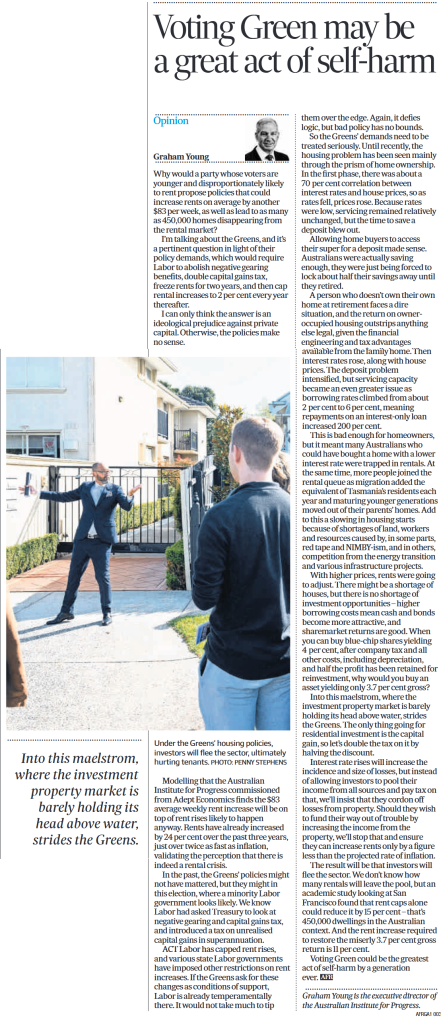 Why would a party whose voters are younger and disproportionately likely to rent propose policies that could see rents increase on average by another $83 per week, as well as seeing as many as 450,000 homes disappearing from the rental market?
Why would a party whose voters are younger and disproportionately likely to rent propose policies that could see rents increase on average by another $83 per week, as well as seeing as many as 450,000 homes disappearing from the rental market?
I’m talking about the Greens, and it’s a pertinent question in the light of their policy demands which would require Labor to abolish negative gearing benefits, double capital gains tax and put a cap on rentals of zero for two years, and then 2% every year thereafter.
I can only think the answer is an ideological prejudice against private capital, otherwise the policies make no sense
Modelling the Australian Institute for Progress commissioned from Adept Economics finds the $83 average weekly rent increase will be on top of rent increases that are likely to happen anyway.
Rents have already increased by 24% over the last three years, just over twice as fast as inflation, and validating the perception that there is indeed a rental crisis.
In the past Greens policies might not have mattered, but facing an election where it is likely the winner will be a minority Labor government they might.
We know that Labor asked the Treasury to look at negative gearing and capital gains tax, has introduced a tax on unrealized capital gains in super, ACT Labor has capped rent rises, and various state Labor governments have regulated other restrictions to rent increases.
If the Greens ask for these changes as conditions of support, Labor is already temperamentally there. It would not take much to tip them over the edge. Again, it defies logic, but bad policy has no bounds.
So the Greens’ demands need to be treated seriously.
Until recently the housing problem has been seen mainly through the prism of home ownership. In the first phase, there is around a 70% correlation between interest rates and house prices, so as rates fell, prices rose. Because rates were low servicing was similar to what it had been, but the time to save a deposit blew out.
Allowing home buyers to access their super for a deposit made sense. Australians were actually saving enough, they were just being forced to lock around half of their savings away until they retired.
A person who doesn’t own their own home at retirement faces a dire situation, and the return on owner-occupied housing outstrips anything else legal, given the financial engineering and tax advantages available from the family home.
Then interest rates rose, along with house prices. The deposit problem intensified, but servicing capacity became an even greater issue as borrowing rates rose from somewhere around 2% to 6% meaning repayments on an interest-only loan increased 200%.
This is bad enough for homeowners, but it meant a number of Australians who could have bought a home with lower interest rate were trapped in rentals.
At the same time more people joined the rental queue as migration added the equivalent of another Tasmania of residents each year and maturing younger generations moved out of home.
Add to this a slowing in housing starts because of shortages of land, workers and resources caused by, in some parts, red tape and Nimbyism, and in others, competition from the energy transition and various infrastructure projects.
With higher prices rents were going to adjust. While there might be a shortage of houses there is no shortage of investment opportunities – higher borrowing costs means cash and bonds become more attractive, and share market returns are good.
When you can buy blue chip shares yielding 4%, after company tax and all other costs, including depreciation, and half the profit has been retained for reinvestment, why would you buy an asset yielding only 3.7% gross?
Into this maelstrom, where the investment property market is barely holding its head above water, stride the Greens. The only thing going for residential investment is the capital gain, so let’s double the tax on it by halving the discount.
Interest rate increases will increase the incidence and size of losses, but instead of allowing the investor to pool their income from all sources and pay tax on that, we’ll insist they cordon-off losses from property.
Should they wish to fund their way out of trouble by increasing the income from the property, we’ll stop that and ensure they can only increase rents by a figure less than the projected rate of inflation.
The result will be that investors will flee the sector. How many rentals will leave the pool we don’t know, but an academic study looking at San Francisco found that rent caps alone could reduce it by 15% – that’s 450,000 dwellings in the Australian context.
And the rent increase required to restore the miserly 3.7% gross return is 11%. Voting Greens could be the greatest act of self-harm by a generation ever.